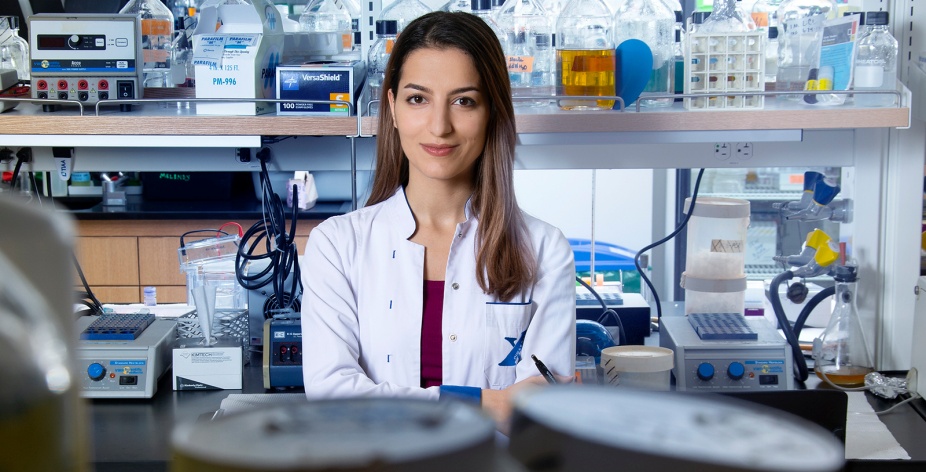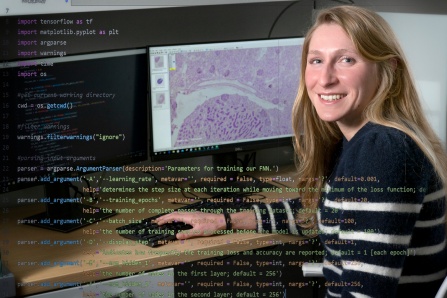Future Students

Who Is the Scientist You See Your Future Self to Be?
Biomedical research training is about discovery — scientific discovery and self-discovery. Our programs and mentors are prepared to be with you every step of the journey to your future. We invite you to explore our innovative curriculum, rigorous research training and supportive and inclusive environment.
Chat with an Ambassador
Put Your Passion Into Practice

With 14 master’s programs, an interdisciplinary doctoral program, a comprehensive MD-PhD program, and undergraduate research, you have more than options here — you have opportunity.
From behavioral neuroscience to cancer biology to regenerative medicine, whatever biomedical science research you’re into, you’ll get to work closely and collaboratively with our world-renowned researchers.
Our Interdisciplinary Approach
Buffalo’s grain silos tower over its inner harbor, and as the City of Buffalo finds new ways to repurpose those historic silos, here in the Jacobs School, we’re tearing silos down!
Our interdisciplinary curricula, our graduate programs, and our collaborative faculty are all working to make sure that students receive broad foundational training no matter what degree is written on their diploma. Even in our specialized departments, there are opportunities to cross-train through coursework, workshops and collaboration. As biomedicine becomes broader and broader in scope, our programs adapt to provide students educational opportunities at the forefront and intersection of science and medicine.
Academic Health Center
The University at Buffalo Academic Health Center brings together the talents of clinicians, educators and researchers to provide a superb research and educational environment to foster basic discovery in the biosciences, health-sciences translational research, preventive and interventional clinical trials, as well as superb clinical care. We train the next generation of health care practitioners.
Benefits
- We are distinct and one of only a few that include the full complement of health schools.
- We provide a unique environment by merging educational training, patient care, health-sciences translational research, and clinical trials.
- We are committed to collaboration with our centralized location in downtown Buffalo at the new home of the Jacobs School of Medicine and Biomedical Sciences.
How Anthony A. Campagnari, PhD, and Mark Ehrensberger, PhD, collaborated across silos to develop an innovative device to treat infections on metallic implants.
As a public school in the SUNY system, the University at Buffalo has a worldwide reputation for excellence but costs much less than private schools. Combine those accolades with the low cost of living in Western New York and funding opportunities, and your return on investment will prove hard to beat.
Applying to graduate, professional, and research programs can be overwhelming! Let us help you. These free resources will guide you as you prepare your application, decide which programs to apply to, and ultimately complete your application.
How to Apply to Grad School

Are you looking for a fulfilling career, but know you'll need more training? That next step can be intimidating, so we guide you through the process. With our faculty experts by your side, you'll master current concepts and research skills, empowering you with the confidence to launch a successful career in the biomedical sciences.
Download our workbook today, and we'll walk you through our 5 tips to prepare you for success!
How to Apply to Grad School YouTube Series
How to Choose a Mentor Workbook
Is selecting a research mentor in your near future? Already feeling overwhelmed by the process?
Don't worry, we've compiled a workbook just for you! How to Choose a Mentor: 7 Steps to Find the Perfect Match is available to download at the link below.
You'll learn what makes a good mentor, how to prioritize your wishlist, how to craft an introductory email, and so much more. Download your workbook, and get started today!

Master’s programs take 1 to 2 years to complete, with the end goal being either gaining employment or continuing on to a doctoral or professional program.
We offer master’s programs that allow you to FOCUS on a particular discipline, providing knowledge and skills in a scientific area that interests you. We also offer an interdisciplinary master’s program that will allow you to EXPLORE the many fields of biomedicine represented in the Jacobs School, providing you flexibility to engage in a broad curriculum and opportunities to gain new breadth of knowledge and improve competitiveness for professional or research-focused advanced degree programs.
Note that master’s programs are typically self funded.
1 to 3 Years Prior
Explore your options and schools
- See which programs have the best fit for you, based on research, structure and faculty mentors.
- Engage with programs by joining mailing lists and by attending fairs and events.
Coursework
- If you are a science major, make sure you are completing all your requirements and doing well in your coursework.
- If you are a non-science major, inquire early about taking biomedical science courses. Your school may have certain restrictions that you’ll want to prepare for.
- If you did not do well in a course, check with your adviser about your school’s repeat policy. Many programs look to see if a course was repeated if the original grade was a C or lower. Many admissions committees will view this favorably.
Letters of recommendation
Begin to build relationships with potential letter writers. Research mentors should be able to write you a strong recommendation if you are working in their lab.
Prepare for any exams
- GRE: Some programs will require this, some will not. Make sure you know beforehand so you can prepare as necessary.
- TOEFL/IELTS: International students should begin to prepare for English Language Proficiency exams, if necessary.
Year of Applying
Verify application deadlines
Make sure your application materials are in before the posted deadline. Some programs will have a rolling admission deadline. You should complete your application as soon as possible to be given priority, as seats may fill.
Request letters of recommendation
At least one recommender should be a professor in the biomedical sciences. Letter writers should be able to speak to your ability to succeed in a master’s program. Make sure you give them plenty of notice, and follow up as necessary.
Write your personal statement and CV
Your CV is a quick way for programs to get to know you, so make sure that your resume tells a clean, clear story in a professional format. Have several people look this over, including mentors and your career services office.
Your personal statement should be unique for each school to which you apply.
You should include:
- why you’re a good fit for that program, and why you want to attend
- your academic and research experiences and strengths
- significant accomplishments
- what sets you apart from other applicants
Have several people look this over, including mentors and your school’s writing center.
Apply!
Follow the school’s instructions on how to apply. Make sure that you submit any additional documents, such as copies of transcripts or test scores. Be sure to submit by the deadline.
If requested, prepare to interview
Some programs will request an admissions interview. If you are invited to interview, you should practice beforehand with mentors and your career services office. Remember, you are also interviewing the school to see if they are a good fit for you!